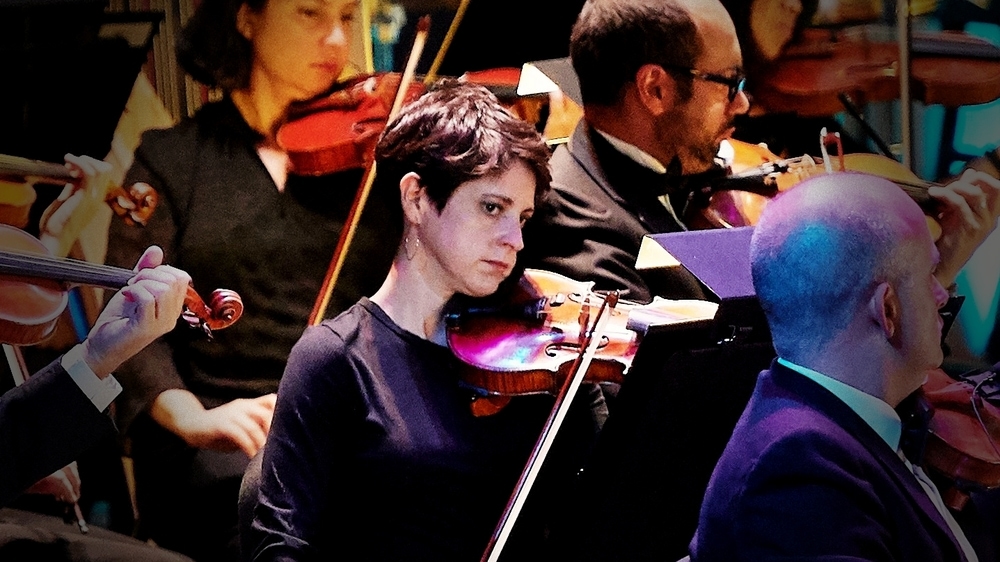
By Violinist Jenny Topilow
As an orchestral player and violinist, like all musicians, I have a long list of compositions that I turn to time and time again for emotional and aesthetic fulfillment on a personal level; works that are particularly beautiful and/or satisfying to me. These pieces include the late Beethoven Quartets, Stravinsky's "Petrushka," Prokofiev's "Romeo and Juliet," Shostakovich Symphony No. 10, the Bartok Quartets, Debussy's "La Mer," Caroline Shaw's "Partita for Eight Voices," and Andy Akiho's "21," to name a few.
It's funny to think, however, that the most memorable and important moments that I have had as a member of the Charlotte Symphony really have nothing to do with my list of favorite works. The most poignant experiences of my tenure as a musician are exactly that, experiences; experiences that have deeply moved me, changed my perception, taught me, connected me to those around me, and have brought me closer to my community.
Major side note: I'm not a huge fan of the term "classical music" as I feel that "classical" is simply a descriptor of a specific era in Western music (i.e. Mozart, Beethoven, and Brahms). I would never discount the absolute brilliance of those composers, yet the breadth of what is coined as "classical music" encompasses so much more than what the antiquated term has to offer. Maybe "orchestral music" and "art music," etc., could serve our purposes better.
But, I digress, because even if I personally believe it's outdated, I still call myself a "classical musician," since the label itself is the most recognized tag for what I do -- interpret and play music written by other people. In that sense, we are more like actors; we are not creators, we are not artists (in my opinion), but we have devoted ourselves to creators and artists. So at its core, even though it is vast, every orchestra on the planet plays music from a finite pool of works. That being said, what I have learned is that it is not the music (alone) that makes an orchestra, but the community that it is part of. The Charlotte Symphony belongs to all of Charlotte; every member of the community should feel ownership of the organization and all arts organizations throughout the city. It's this sense of ownership that builds commitment, connection, and those beautiful, profound experiences through music that are transcendent, beyond the notes on the page. All art for all people.
It would be remiss of me to not give personal examples of music plus circumstance making for meaningful experience. Here are two:
- The CSO accompanied the Morehouse College Glee Club in a performance of Atlanta based composer Joel Thompson's "Seven Last Words of the Unarmed," a work that uses the liturgical format of Haydn's "Seven Last Words of Christ" to honor and humanize black men unjustly murdered, namely Michael Brown, Trayvon Martin, Oscar Grant, Eric Garner, Kenneth Chamberlain, Amadou Diallo, and John Crawford. It is a sobering piece that reminds us of how powerful art can be when inspired by, and dedicated to, relevant and pertinent issues. The experience of the performance connected everyone in the room through a shared understanding of the necessity of the message and the emotion of that message being delivered through song by those directly affected by the theme of the work.
- Last season the CSO started a series called CSO Off the Rails, where smaller ensembles curate programs to be played at Snug Harbor, a local club/bar/music venue and Charlotte staple. Essentially standing room only with a small stage about three feet off the ground, these shows are really an immersive and interactive experience, bringing what we do to an audience that wouldn't necessarily seek out music at a concert hall. The success of the series, the energy surrounding it, and the electric atmosphere in the room during performances has solidified in my mind that "classical music" is completely accessible to everyone when we remove the formality and actively engage with the community.







